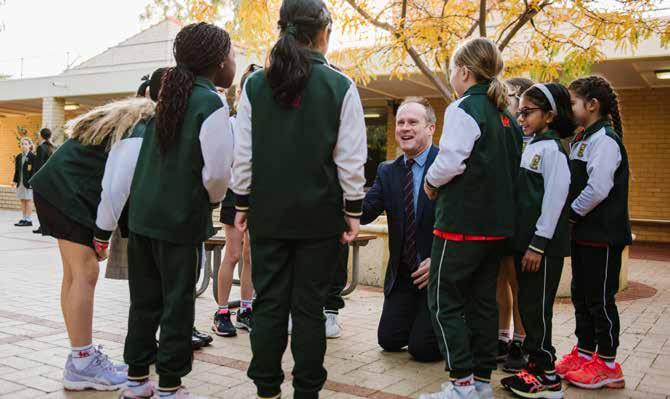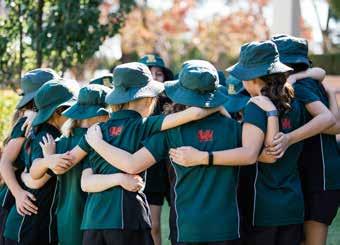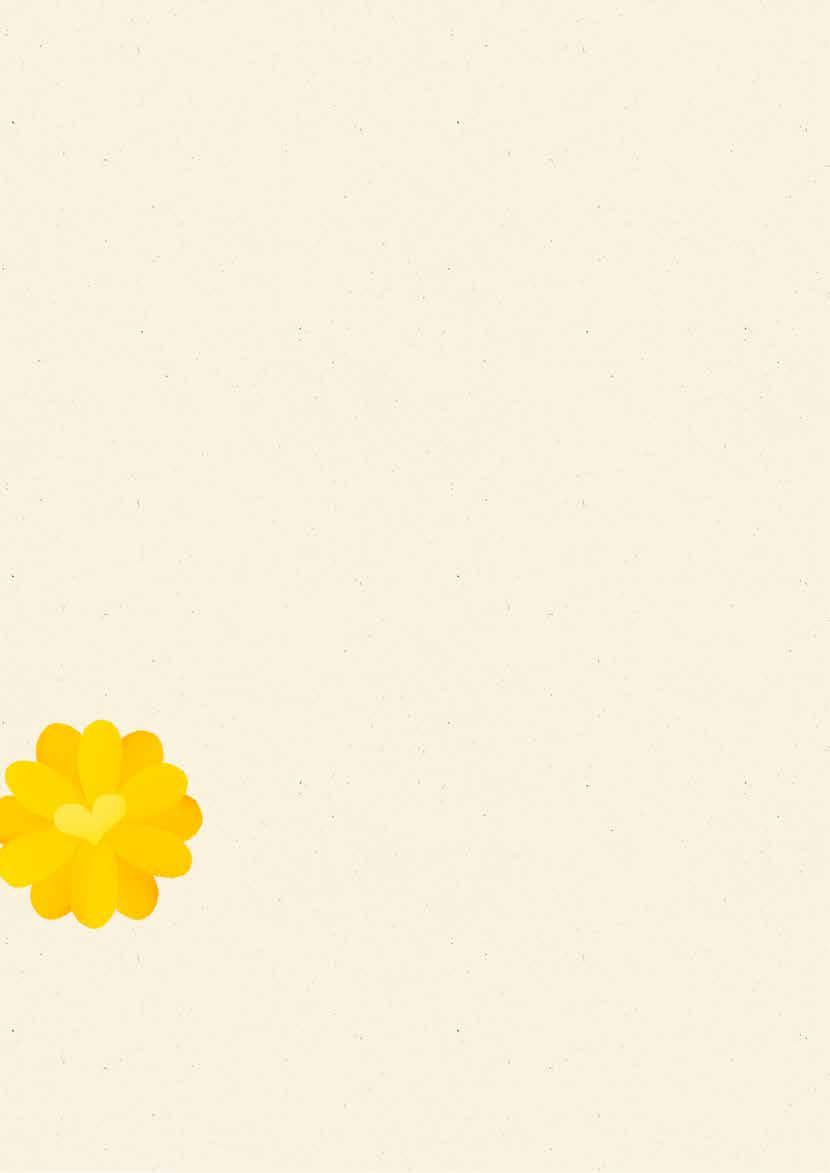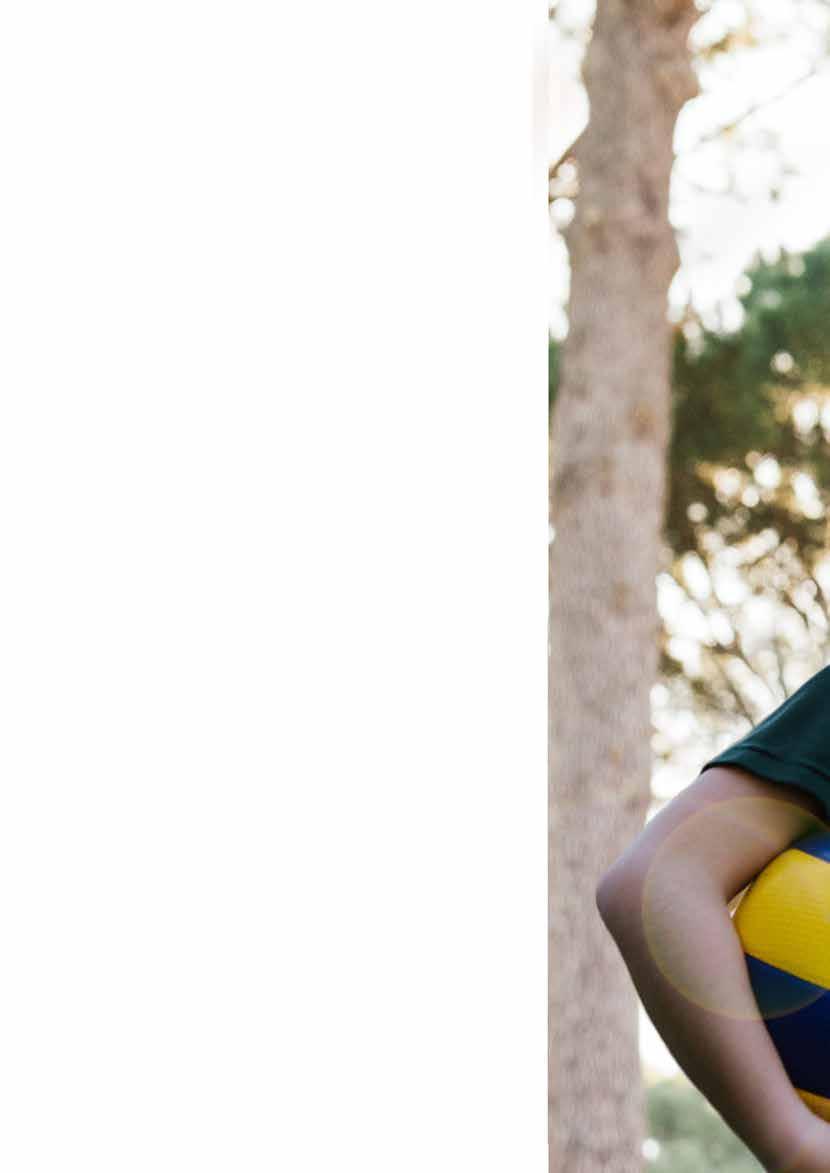





A warm welcome to Penrhos College!
Your daughter is now part of our vibrant, warm and friendly community — and so is your whole family. The sense of belonging that you and your daughter will enjoy is underpinned by the emphasis we place on positive relationships and open communication.
We hope this Handbook will be helpful to you in outlining our philosophy and providing some simple, practical information about College operations.
Many exciting opportunities and experiences lie ahead for your daughter in Junior School. We pride ourselves on offering activities which are designed to extend each student’s learning and development so that each child may flourish, in every domain. Key skills in literacy and numeracy are naturally essential, and you will be regularly informed with regard to your daughter’s progress in these areas. Of equal importance is our focus on her happiness and wellbeing, with a proactive and preventative approach to socio-emotional development and peer relationships to help ensure a sense of security and belonging.
Our mission in the Junior School is to not only prepare each child for the transition into Secondary School, but to ensure our students are ready for the world. We grow strong, independent young women — with positive mindsets, compassion for others and the motivation to make the world a better place for all.

We value the voice of our students – the thoughts they articulate can be thought-provoking and insightful, full of wonder and certainly full of fun. We are so proud that our Junior School motto was developed when we asked the girls for their opinion on what we do well at Penrhos, one of our Year 2’s simply wrote ‘Love Grows Here’ as her response.
This motto is evidence of our safe and caring culture at Penrhos. We believe warm, positive relationships provide a secure base upon which our students flourish and develop a life-long love for learning. Love is at the very heart of our Junior School experience.
It is my great pleasure to welcome your family, to ours.
Wayne Revitt Head of Junior SchoolPenrhos College is a vibrant and thriving community of around 1,000 students, 250 staff and almost 10,000 alumni. From our very earliest days, we have placed our students firmly at the centre of all that we do and our motto ‘Strive for the Highest’ continues to be as relevant today as it was in 1952. Our purpose is clear: to inspire girls to become extraordinary women; for each girl to be the best that she can be given her unique gifts, talents and passions. Our ethos is based on a sense of each girl making a meaningful contribution in the world, whatever life path she may choose.
Our educational philosophy recognises the equal importance we place on the nurture of mind, heart, body and spirit, throughout the phases of developmentfrom the young girl in Pre-Kindergarten to the young adult in Year 12.
The notion to inspire is expressed by providing: Learning experiences and opportunities across the academic, pastoral, co-curricular and spiritual curriculum to engage, excite and challenge our students
Staff of the highest calibre
A cultural and physical environment that is a safe, welcoming and happy place to work and play
A community that collectively nurtures our students throughout their personal learning journey
Penrhos is a faith community, in the tradition of the Uniting Church, and this — together with our core shared values of respect, empathy, integrity, knowledge, growth and synergy — guides our actions and interactions with one another.
We value the partnership between the College and our parents, in working together to ensure the very best learning experience for their daughters. The diverse and balanced education we offer allows each girl to explore and realise her strengths, abilities and passions to achieve her personal best. Our vision is that each girl will have the strength to own her own voice, stand up for what she believes, to challenge convention and to pursue her dreams well beyond her school days and into her future.

Our purpose is clear: To inspire girls to become extraordinary women, so that they will make a positive contribution to the world in which they live.
In the Early Years and through to Year 6, we ground our practices in the Alice Springs (Mparntwe) Education Declaration made in December 2019 by all Australian Education Ministers, along with the principles of the Early Years Learning Framework, developed by the (Federal Government) Australian Children’s Education and Care Quality Authority.
The Alice Springs (Mparntwe) Education Declaration (December 2019) provides the blueprint for educational philosophy for all Australian schools. It has two goals: (1) an education system that promotes excellence and equity, and (2) for all young Australians to become confident and creative individuals, successful lifelong learners and active and informed members of the community.


At Penrhos we have high expectations for learning; we provide stimulating experiences, promote personalised learning and enable our students to learn about (and engage) with the world; all our goals are aligned with the first goal of the Education Declaration. We also focus on the second goal, with emphasis on developing a sense of belonging, growing resilience, valuing initiative and agency, fostering a love of learning, and nurturing a sense of optimism about the future.
We know that successful lifelong learners need to: play an active role in their education have essential skills in literacy and numeracy as the most important foundation for learning be able to think deeply and critically be creative in solving real world problems be able to collaborate and be flexible in their thinking be motivated to achieve their full potential and personal best.
Penrhosians are proud to be community-focused individuals who act with integrity, have empathy for others, respect difference and are responsible global citizens.
The Early Years Learning Framework is a view of children’s lives as characterised by Belonging, Being and Becoming:

From before birth children are connected to family, community, culture and place. Their earliest development and learning takes place through these relationships, particularly within families, who are children’s first and most influential educators (Early Years Learning Framework, 2009).
Our role at Penrhos is to build on the foundations laid by our parents, so that our girls may continue to grow in love, security and happiness; together, we will collaborate on her learning journey to ensure she has every support in achieving her personal best.
Belonging acknowledges children’s interdependence with others and the basis of relationships in defining identities. In early childhood, and throughout life, relationships are crucial to a sense of belonging. Belonging is central to being and becoming in that it shapes who children are and who they can become (EYLF 2009).
Penrhos offers a wide range of co-curricular experiences to complement an excellent academic program. However, the sense of Penrhos place and belonging that your daughter will experience will stay with her, long after your daughter has graduated into our alumni networks. It is the comradery with friends, the impact of dedicated teachers and the connections with community that most powerfully underpin lifelong wellbeing and success.
Childhood is a time to be, to seek and make meaning of the world. Being recognises the significance of the here and now in children’s lives. It is about the present and them knowing themselves, building and maintaining relationships with others, engaging with life’s joys and complexities, and meeting challenges in everyday life. The early childhood years are not solely preparation for the future but also about the present (EYLF 2009).
We honour and acknowledge the sense of joy, curiosity and wonder expressed by each child. We are ever conscious and mindful of the need to enjoy each day, to celebrate little milestones and to follow the lead of your daughter wherever possible. Childhood is not a race; by respecting the agency of each individual girl, we work collaboratively to foster a sense of autonomy and resilience, taking each day at each child’s own pace.
Children’s identities, knowledge, understandings, capacities, skills and relationships change during childhood. They are shaped by many different events and circumstances. Becoming reflects this process of rapid and significant change that occurs in the early years as young children learn and grow (EYLF 2009).
During the Junior School years, your daughter will make significant advances in all domains - cognitive, socio-emotional and physical. Our role is to nurture the whole child, across the Penrhos whole person paradigm of mind, heart, body and spirit so they may have the strength and resilience to deal with life’s many challenges, and the capacity to make a positive difference in the world.
We are constantly reminded about the mental health challenges faced by our children. A recent (2020) survey, conducted by the Commissioner for Children and Young People in WA, found girls are more stressed about their weight, mental health and safety than boys — with 44 percent of girls saying they do not feel good about themselves.
We also know that, by 2030, our Pre-K will graduate from Secondary School at a time when depression will be the greatest burden of disease across the planet (World Health Organisation). Our response to these issues as a College is crucial - we need to be aware of the complex issues faced by our girls and provide the life skills required for each to find her own individual sense of purpose, happiness and success.
We work in close partnership with families, in order to develop the same language, the same goals and to work towards the same outcomes. Together, we provide the supportive life infrastructure that enables our girls to have fun and enjoy school, so that they might enjoy their learning and do as well as they can. Our warm and trusting relations with children and their families underpin the all-important sense of belonging which enables children to most effectively engage in their learning environments and experiences.
Our balanced curriculum incorporates play-based learning and intentional teaching to address the requirements of the Australian Curriculum, Early Years Learning Framework and the State Curriculum and Standards Authority.
Equally, we acknowledge the importance of our role as educators in promoting the emotional development of all students. Our proactive, preventative approach is grounded in the core social and emotional learning competencies according to CASEL (Collaborative for Academic, Social
and Emotional Learning) and the central tenets of Positive Psychology. Each program and strategy is carefully matched to the developmental needs of our students. In the Early Years, the Kimochis program and the PATHS (Promoting Alternative Thinking Strategies) programs complement the Keeping Safe (Protective Behaviours) lessons and other aspects of socio emotional learning embedded in our curriculum. The UR Strong program in the Junior School has a focus on friendship skills and social problem solving that is most helpful in the upper primary years. In the Early Years, we recognise that nurturing and responsive relationships build healthy brain architecture, to provide a strong foundation for learning, behaviour and health.
Personal wellbeing and effective relationships underpin every girl’s success and achievements. Each girl’s ability to strive for her highest is supported by a strong pastoral care framework (Connect) along with a unique new initiative, the Full Circle wellbeing program for adults in the Penrhos community. This comprehensive pastoral pedagogy, from Pre-Kindergarten to Year 12, supports each student’s emotional and social development across the years with ongoing support for each Penrhos family through Full Circle.
Every student is encouraged to actively model our shared College values of Knowledge, Growth, Synergy, Respect, Integrity and Empathy from the earliest age. Our programs and practices complement each other to support our girls’ growth as independent, resilient young individuals with a strong sense of self, a meaningful and enduring connection to Penrhos and a genuine respect for their peers and the wider community. Creating opportunities for even the youngest students to engage in calculated risk-taking and goal-setting as they build their self-confidence and self-esteem is at the very heart of our pastoral approach.


Our pedagogy, or teaching and learning practice, is balanced. We use only evidence-based programs and will keep you informed of your daughter’s progress, every step of the way. Numeracy and literacy underpin everything we do in the classroom as fundamental skills — specific intervention may on occasion be required in these areas to support development and growth. Our strong specialist, extension and support programs contribute to the provision of a balanced curriculum to ensure each girl has the opportunity to achieve her personal best and reach her full potential. Specialists subjects include Art, Music, Drama, Dance, Physical Education, Library and Digital Technology, and Languages (Japanese).
We balance our explicit focus on the teaching of literacy and numeracy skills with a guided inquiry-based approach from Years 3 to 6. This builds on our pedagogy in the Early Years

and stimulates our students to learn through curiosity, wonder and collaboration — an approach which enables an authentic degree of questioning and problem-solving in the classroom!
Ours is an all-girls environment and we are committed to the benefits of single-sex education. Research shows the positive effects of single-sex schooling in numeracy and literacy testing, and in tertiary entrance scores. We can see that girls benefit from learning environments which are free from gender stereotyping — with regard to the subjects they study, the activities they participate in and the interests (or later, careers) they choose to pursue. Penrhosians behave more competitively without social pressure from boys, they perform at higher levels in sport and physical education, and become generally more confident and assertive in both their learning and personal environments.
Our assessment framework will include diagnostic assessments, formative assessment (to determine previous knowledge and track progress) and standardised tests against state/national norms, together with student reflections including peer evaluations. Assessments are important at the end of a piece of work; however, formative assessments have a greater impact in shaping effective learning in real-time; this may include anecdotal feedback, checklists, rubrics and praise for effort and understanding.
Parents are invited to meet with teachers at any time during the year.
Please note the following reporting and information sharing summary:
TERM 1
Parent Information Night — this will take place on the first Wednesday of the school year, as advertised. Key messages from College leaders will take place in the Chapel, followed by a visit to your daughter(s) classroom for more specific information from your class teacher.
Parent / teacher meetings — you may wish to meet with your teacher early in Term 1 to discuss your daughter’s learning/social needs. Please be encouraged to arrange a meeting to suit you. Towards the end of term, you will be invited to meet with your daughter’s teacher to discuss the results of assessments and provide an opportunity for you to give feedback.
TERM 2

Formal Report — students from Pre-Primary to Year 6 will receive a written report. This includes grades assigned against state curriculum benchmarks and indications of effort, plus personal and social development. These will be electronically accessible, for parents to read and reflect on as a summative assessment.
TERM 3
Inquiry journeys — at the end of Term 3 you are invited to each classroom to be led by your daughter through her many accomplishments over the year, across a range of work and a variety of formats. The experience enables each student to take ownership for her learning along with the responsibility of sharing it with her family.
TERM 4
Written Reports — this is the final summative assessment for the year, in a similar format to the Term 2 Report. Students in Kindergarten and Pre-Kindergarten also receive a formal report, based on the Kindergarten Guidelines and the principles of the Early Years Learning Framework.
Throughout the year, you will be informed of your daughter’s program and progress via our Learning Management System, Compass.
The following general information may be useful. Please contact our Admin team with any queries – we are always more than happy to help!
Our Education Management System, Compass, will enable you to record student absences. You will be provided with Compass login details on enrolment. Alternatively, please email jsadmin@penrhos.wa.edu.au prior to 8am on the day of a student’s absence, or phone the Junior School Reception on 9368 9555. If your daughter is absent for longer than one day, you must register her absence on each separate day. Please ensure that all late arrivals, sign in/outs, appointments and music lessons are recorded at the Junior School Reception.
Any changes to address, phone number, medical conditions and emergency contacts should please be submitted in writing to Anushia Suppiah, College Admissions and Growth Manger, at enrol@penrhos.wa.edu.au
An extended leave of absence requires a written and personally signed request to the Head of Junior School, Wayne Revitt, via Junior School Administration
Penrhos College is allergy aware and a ‘nut free zone’, which means that NO NUTS or food items containing nuts can be brought for recess or lunch, or for the provision of any treats e.g. birthdays and class parties. Students are discouraged from sharing food items, recess snacks and lunches. We ask families to assist by not sending ‘food to share’ in school lunch boxes so, we are better able to provide a safer environment for students with food allergies.
Assemblies (for Pre-Primary to Year 6) are held on Friday mornings in the Rixon Theatre, as per the calendar. Awards are given at Assemblies, and you will be notified if your daughter is to be an award recipient. We also hold an End of Term Assembly, along with the Year 6 Graduation, on the last day of the school year. Our Assemblies are very much a time for gratitude and celebration — you and your immediate family members are warmly invited to join us.
We love to celebrate birthdays! You are welcome to bring in food items for the class on your daughter’s special day. Children with allergies are asked to supply some small items at the beginning of each year, so they are not left out if they are unable to eat the birthday treat provided (these will be kept in a staff drawer or freezer). Lollipops on sticks are not suitable for safety reasons.
Please note that birthday party invitations are not to be

given out at school. This is a strict Junior School policy, to avoid disappointment for those who do not receive one. Please contact your class Parent Representatives for parent email information if required.
Birthday ribbons are presented at the Junior School Chapel Service, to students who have a birthday falling on the Monday of the Chapel Service through to the following Sunday. Students who are absent will be presented with their birthday ribbons in class by the Head of Junior School, at the first available opportunity.
The College will source and provide all stationery and textbook items, as required for each year level. Parents do not need to order or source any stationary or other items. This reduces waste, makes life easier for our parents and encourages sharing among students.
Students using the bus service are required to walk unsupervised to the Thelma Street bus stop — this area, including the cross-walk, is supervised by duty staff. Junior School students are not permitted to use the Morrison Street bus shelters.
Our Chapel service in the Junior School, for Kindergarten (Kindergarten from Semester 2 onwards) to Year 6, is held on Monday morning, at 8.40am. Parents are welcome to attend, and families are seated upstairs. Our Chapel service is a wonderful way to start the week and to share in the Christian values of our community. The entire Year 5 cohort forms our Chapel Choir.
The College is committed to safeguarding and promoting the safety, welfare and wellbeing of children and young people - all staff, volunteers and visitors are expected to share this commitment.
All children and young people who come to Penrhos College have a right to feel and be safe. We are committed to providing a child safe and child friendly environment, where children and young people feel they are able to actively participate in decisions that affect their lives. We have zero tolerance for child abuse and other harm; we are committed to acting in students’ best interests and keeping them safe from harm. Our environment is friendly and welcoming to all children and young people, and our child safety protocols are designed to reflect the National Principles for Child Safe Organisations.
We actively seek to include students in decisions that affect them. We ensure students know about their rights to safety, information and participation. We recognise the importance of friendships and support from peers. We actively seek to understand what makes students feel safe within the College environment and we regularly communicate with students about what they can do if they feel unsafe.
In the Junior School, our Clinical Psychologist oversees our Keeping Safe (Protective Behaviours) and Wellbeing curriculum, in keeping with our commitment to the safety and wellbeing of our students as paramount. We believe in a proactive, preventative approach — we develop the skills required to identify, regulate and discuss emotions, so that each child may communicate about their personal safety, and safeguard the wellbeing of others. For more information, you are most welcome to arrange a time to meet with Dr Katherine Russell-Smith (russek@penrhos. wa.edu.au).

The Junior School offers an extensive range of co-curricular activities throughout the year, from Kindergarten to Year 6. Details of activities will be forwarded to parents via Compass, as applicable to your daughter’s year group.
Classroom doors open at 8.15am and class begins at 8.30am (please note the Pre-Kindergarten door is open at 8.20am and class begins at 8.40am). Please be aware there is no staff supervision in the Courtyard prior to 8am for Years 3 to 6, nor before 8.15am in the Early Learning Centre. However, the Dragon X program is available for Kindergarten to Year 6 from 7.15am, in the Library. Students who arrive prior to these times are not covered by the Duty of Care provided by the College. The same applies to those students who remain on campus after 3.40pm.
Afternoon bell times:
Year Group Time Collection Point
Students are to make their way to designated collection points, following after-school co-curricular activities, where they are to be signed out by a parent/guardian. Students who are picked up late (by more than 15 minutes) will be registered with the Dragon X Program - please note this will incur a cost.
Should you not always be able to collect your daughter, you must submit hard-copy signed advice stating the names of other adults who are permitted to pick up on your behalf. This information is collected at the beginning of each school year and it is the responsibility of each parent to update their list of authorised adults, should changes occur throughout the year.
As it is not always possible to make personal contact with each individual parent, the diary provides an important medium for daily communication. Parents are encouraged to use the diary for this purpose. Your daughter will record all homework activities, important dates for events, reminders and a reading log in her diary. Classroom teachers review and sign student diaries every day.
The Dragon X Club provides an extended school day for students (Kindergarten to Year 6) that includes an opportunity to complete homework, play, socialise, read and engage in games. This operates from the Junior School library from 7.15am to the start of the school day, and until 5.30pm, each afternoon. There is a small fee for the afternoon session, the mornings are not charged. To register, please contact Junior School reception: jsadmin@penrhos.wa.edu.au.
Students wear the Penrhos uniform as outlined in the Student Diary and Uniform Guide. Please clearly label all belongings, as there are many items in lost and found, which are all of a similar size. The children wear their green bucket school hats for outdoor play all year round; formal white hats are worn to and from school for students in Years 4 to 6. The green bucket hat remains in your child’s locker.
Kindy 3pm 3.10pm Front entrance of the ELC building
Pre-Kinder
Pre-Primary Year 1 Year 2
3.15pm Main Administration forecourt
All students and staff are allocated to a House. We have four Houses: Rome (red), Sparta (yellow), Athens (green) and Troy (blue). The House system is used for both sporting and cultural activities. Students whose family members are Penrhos alumni are usually placed in the same house as the related alumna. Regular opportunities will be provided for our students to interact with fellow House students of all ages, including Secondary students, on Pastoral Days.
Interschool activities are formally arranged through the Independent Primary School Heads Association (IPSHA). Junior School students in Year 3–6 participate in a wide variety of events and activities, from sporting to cultural. Member schools take responsibility for arranging events for the benefit of all. IPSHA events are largely non-competitive; although individual students are recognised for winning events, schools and colleges do not receive overall trophies. Other activities with Independent Primary Schools are arranged on an informal basis.
All Year 2 to 6 students are assigned a locker for storage of bags during the school day. For security reasons, they are not to be used for storage of student possessions overnight. The lockers are not to be decorated inside. Notebooks cannot be stored in the students’ locker. All musical instruments are to be stored in the music lockers at the bottom of the internal stairs.
If your daughter is unwell, please do not send her to school. Illnesses such as gastroenteritis, conjunctivitis, coughs and colds are highly contagious and can spread rapidly through a group of young children. We closely follow protocols set by the Health Department for the management of COVID-19 and will keep you informed of any action required. Anti-bacterial hand gel is available in all classrooms and further information about contagious diseases can be obtained from the Health Centre. The College Nurse will contact parents, should any student fall ill at school or present when she is not well enough to attend.
For all students in the Junior School with medical conditions such as Anaphylaxis, Asthma, Epilepsy etc, an updated Allergy Action Plan (signed by a GP/Specialist) is required. Copies will be provided to relevant Administration offices, the class teacher and the Health Centre. Relevant medication must also be provided. Should a student need to take medication during the day, please arrange this with the Health Centre. Junior School staff are not permitted to administer medications.
The Health Centre can be contacted on 9368 9505 or email health@penrhos.wa.edu.au
Students may carry a mobile phone, providing they observe the following conditions:

• mobile phones are to be turned off and unmonitored during the school day
• all contact between students and parents/guardians should be made formally and in line with protocols via Junior School Reception
• mobile phones are brought to school at the students’ own risk.
All information regarding Music lessons will be available via Compass and/or our website. If you have any queries, please contact the Music Administration Coordinator on 9368 9671 or email musicadmin@penrhos.wa.edu.au. Please note students and parent/guardians must notify peripatetic music teachers of any potential diary conflicts with music lessons, at least 48 hours in advance, to allow adequate time for lesson re-scheduling.
As an integral part of the Junior School classroom music program, every Year 5 student will receive free tuition on a concert band instrument, and every Year 2 student on violin, viola or miniature cello. This includes free use of a College instrument along with the required tutor book for the entire year. Students will be tested for musical aptitude, checked for physical suitability and asked to rank their instrument preferences. Weekly lessons and ensemble rehearsals are conducted in small groups during class music time and tutored by the relevant peripatetic specialists (please note this program does not therefore impact on any academic programs).
You are welcome to contact your class teacher to arrange a meeting at the start of the year, should you have any specific information you wish to share. Your daughter’s teacher will additionally arrange to meet with you towards the end of Term 1, to discuss the results of formal and informal assessments, to review progress and set goals. If you require a further meeting with a member of our learning enhancement staff, please contact the Deputy Head of Junior School.
At the end of Semester 1, you will receive a written report (with the exception of Pre-Kindergarten and Kindergarten) and, at the end of Term 3, you will be invited to share in a Learning Journey in your daughter’s classroom. You will be kept informed of your daughter’s progress through our Learning Management System, Compass. Early Learning Centre parents will receive regular updates via the Seesaw App (login detail will be sent early in the year). All students will receive a written report at the end of the school year.
The ongoing relationship between our families and staff is very important. You are welcome to arrange to meet with your class teacher at any time of the year; the same applies to specialist teachers and any other teacher who works with your daughter.
Please arrange to meet with the Head or Deputy Head of Junior School, should you have any further queries. Often a ‘face to face’ meeting is more effective in establishing supportive and productive relations. Our aim is to ultimately to work with you, in partnership, for the benefit of your daughter.
Please avoid bringing personal toys or items to school, as far as is possible, since any loss or accidental damage can be very distressing. If your daughter brings a toy or object to school as part of their news telling, this will be kept safe by the class teacher until news time and returned at the end of the school day.
Please send a labelled water bottle with your child each day, to keep in the classroom, particularly during the hot weather.
Having an easily accessible bottle allows the girls to drink plenty of water throughout the day, without having to leave the classroom. The girls can refill their bottles during their break times.
Please note your daughter must wear a hat, whenever outside. Green bucket hats are to be kept at school in your daughter’s locker during the week. Please also ensure sunscreen application prior to school each morning. Sunscreen is additionally located in each classroom for additional applications throughout the day, as required.
Penrhos College encourages all staff, students and their families to be aware of the dangers of skin cancer and to take preventative measures — whether at school, travelling to and from school, or in situations away from school.
This Handbook is designed to provide answers to the most commonly asked questions - we appreciate it is by no means a definitive reference point. Compass, our College website, the Seesaw App (for Early Learning), Penrhos social media platforms and periodical publications (including The Penrhosian and SAGA) will provide you with a wealth of information throughout the year.

The majority of our communication with you, including events, carnivals, excursions and camp details, with be through Compass. This is a digital school management system, available through all devices including laptops, PCs, smart phones and tablets - it connects the school community with valuable resources via a single platform. If you require assistance with Compass, please call IT Support on 9368 9567 or email itsupport@penrhos.wa.edu.au.
Please contact our friendly and helpful Admin team with any further queries.
And a very warm welcome, once again, to our wonderful Penrhos College community!
